Inside Gwyneth Paltrow’s $1,600 hormone summit there’s plenty of Goop, but also some good
On a sunny spring Saturday, a well-heeled, mostly middle-aged crowd of about 100 Gwyneth Paltrow devotees gathered at Goop headquarters in Santa Monica for “Goop Immersive: Hormonal Edition.” As I waited for my cappuccino in a line of VIP shoppers and newsletter subscribers sporting an abundance of Chanel handbags, I felt underdressed in jeans, sans blowout.
The $1,600 price of entry, which included a luxury gift bag filled with Goop-approved beauty and skin care products, candles, a bath towel, silk pillowcases and a pair of New Balance sneakers, didn’t seem to faze anyone. In fact, some women had made a weekend of the event, flying in from Atlanta, Orlando, Milwaukee and Philadelphia. There was an infrared sauna and plenty of fruit-infused water, avocado toast and pastries. The Goop shop was open with jewelry, skin care and clothing on display. The real draw, though, was the candid, free-flowing conversation about hormones the event promised.
“When I received the invitation, I had been working with my gynecologist for the last couple of months … so the topic could not have been more applicable to what I was going though,” said Stacy Howard, 43, an attorney who had flown in from Chicago and was looking for guidance on cognitive issues in perimenopause. She expected to have at least 20 more years in her career and was interested in brain health. “I have one colleague at work who’s going through it, and she and I talk about it, but none of my other peers are.”
According to UN data, by 2050, 1.65 billion women globally will be age 50 or over. The average age in the U.S. for menopause — defined as going a year without a period — is 51; in the U.S., around 1.3 million women enter menopause per year. Eighty percent suffer from unwanted symptoms, which can include hot flashes, night sweats, weight gain, vaginal dryness, low libido, anxiety, mood swings, depression, heart palpitations and brain fog.
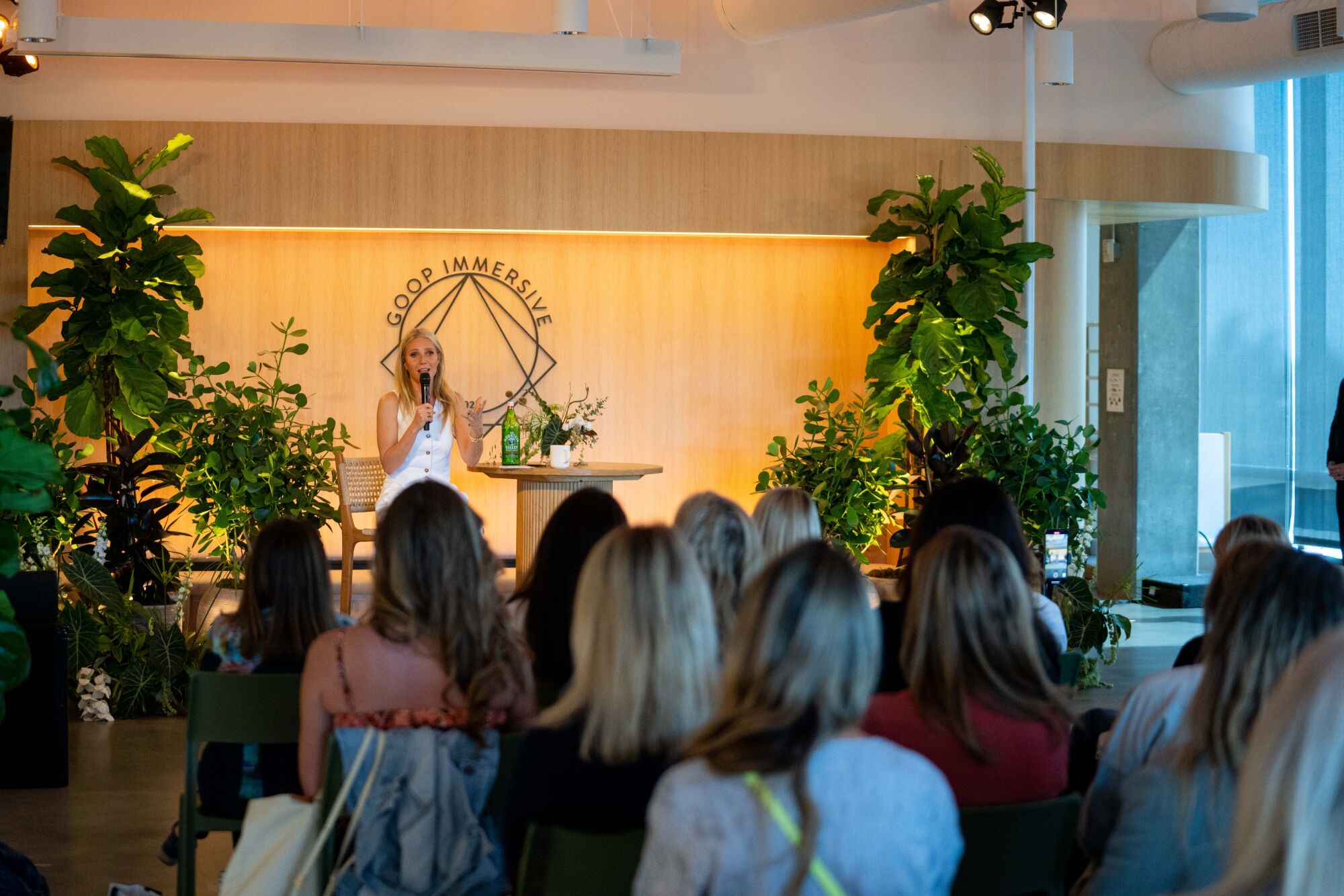
Gwyneth Paltrow holds court at the Goop Immersive event in Santa Monica.
(Kyle Espeleta for Goop)
Yet the medical profession hasn’t kept up, in part due to the landmark World Health Initiative study in 2002, which brought attention to a link between using estrogen and breast cancer, resulting in a dramatic, widespread decrease in doctors prescribing hormone replacement therapy, or HRT, to treat menopausal symptoms. Even though the study has been challenged — “for women in their 50s, the benefits of hormone therapy far outweigh the risks,” said Dr. James A. Simon, clinical professor at the George Washington University — the damage was done. (Hormonal contraceptives like birth control pills are also linked to a small increased risk of breast cancer.)
“We’ve literally spent 20 years trying to correct that record, because the findings were never as bad as they initially reported,” said Dr. Sharon Malone, chief medical advisor at Alloy Health, a menopause-focused telehealth network. “But it shut down the conversation. When you say the words breast cancer, it was game, set, and match.” Women were left scrambling, and the gates were opened wide for those promising help via alternative treatments.
Menopause is money
Though hormone therapy is making a comeback, there’s still plenty of work to be done.
Enter Goop — and other players interested in this lucrative, largely untapped space. The global menopause market, which includes medications, dietary supplements, sexual enhancements and menopause treatments, is estimated to be worth $24.4 billion by 2030. And the stars, they’re going through it too. Thanks to people like Michelle Obama, who began talking about menopause on her podcast years ago, others have become emboldened. Oprah Winfrey, Naomi Watts, Drew Barrymore and Tracee Ellis Ross have openly shared their experiences. Glennon Doyle has made menopause a favorite topic on her “We Can Do Hard Things” podcast. We even saw a menopause-themed commercial during the Super Bowl this year.
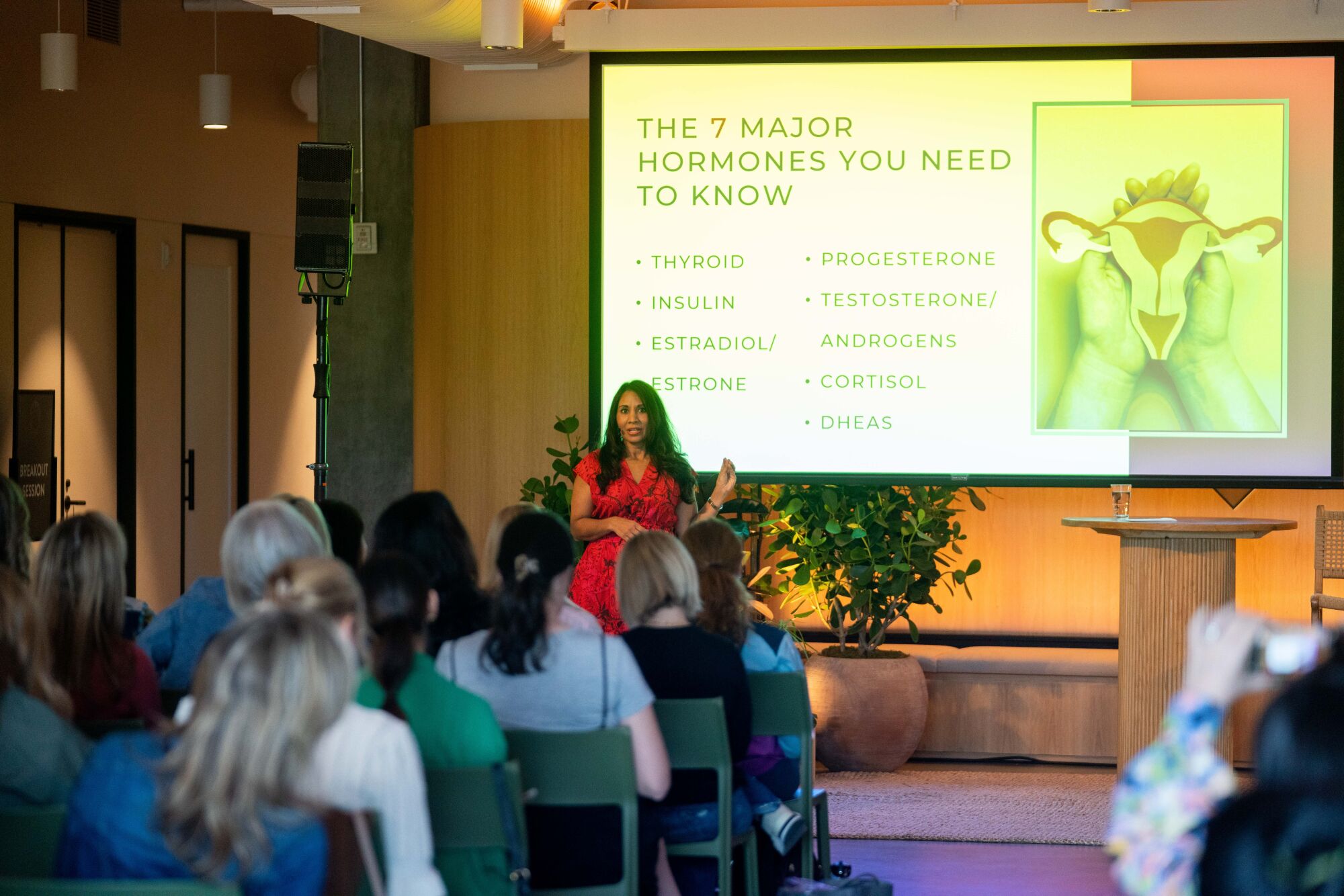
Dr. Taz Bhatia discusses hormones at the Goop event in Santa Monica.
(Kyle Espeleta for Goop)
Goop, which Paltrow, 50, began as a newsletter in 2008, is valued at $250 million — and menopause fits firmly in her wheelhouse of alternative women’s health. The site sells a wide variety of products and wellness supplements, like “Madame Ovary” and “DTF” (yes, that stands for what you think it does), a supplement that purports to support “women’s desire, arousal and mood.” A search for the words “hormone health” on Goop.com offered some 230 results, including podcast episodes, products and articles, like one titled “Can Seed Cycling Bring Your Hormones Into Balance?” There are devices to promote pelvic floor health, vibrators — some with red light therapy — and lube. Doubling down, Paltrow, along with middle-aged peers Barrymore and Cameron Diaz, is an investor in Evernow, an online hormone-prescribing company founded in 2019 that aims “to build a new way of delivering healthcare based on science, innovation and women’s lived experience with menopause.”
In case you haven’t noticed, menopause is getting a makeover. Hormones have become a buzzword on social media, with the need to “heal” your hormones thrown constantly at women of a certain age. Weight gain? It’s your hormones. Belly fat or bloating bothering you? This gummy supplement or herbal powder will “balance your hormones” and make it go away. Have a headache? Hormones! Sluggish thyroid? There’s a supplement for that
In keeping with the trend, after a guided meditation, the Goop Hormonal Immersive kicked off with Dr. Taz Bhatia, an integrative medicine physician, sharing her theories on “dirty hormones” and “hormonal imbalances.” She recommends women use herbs, essential oils and homeopathic remedies, which she also sells, to combat these problems.
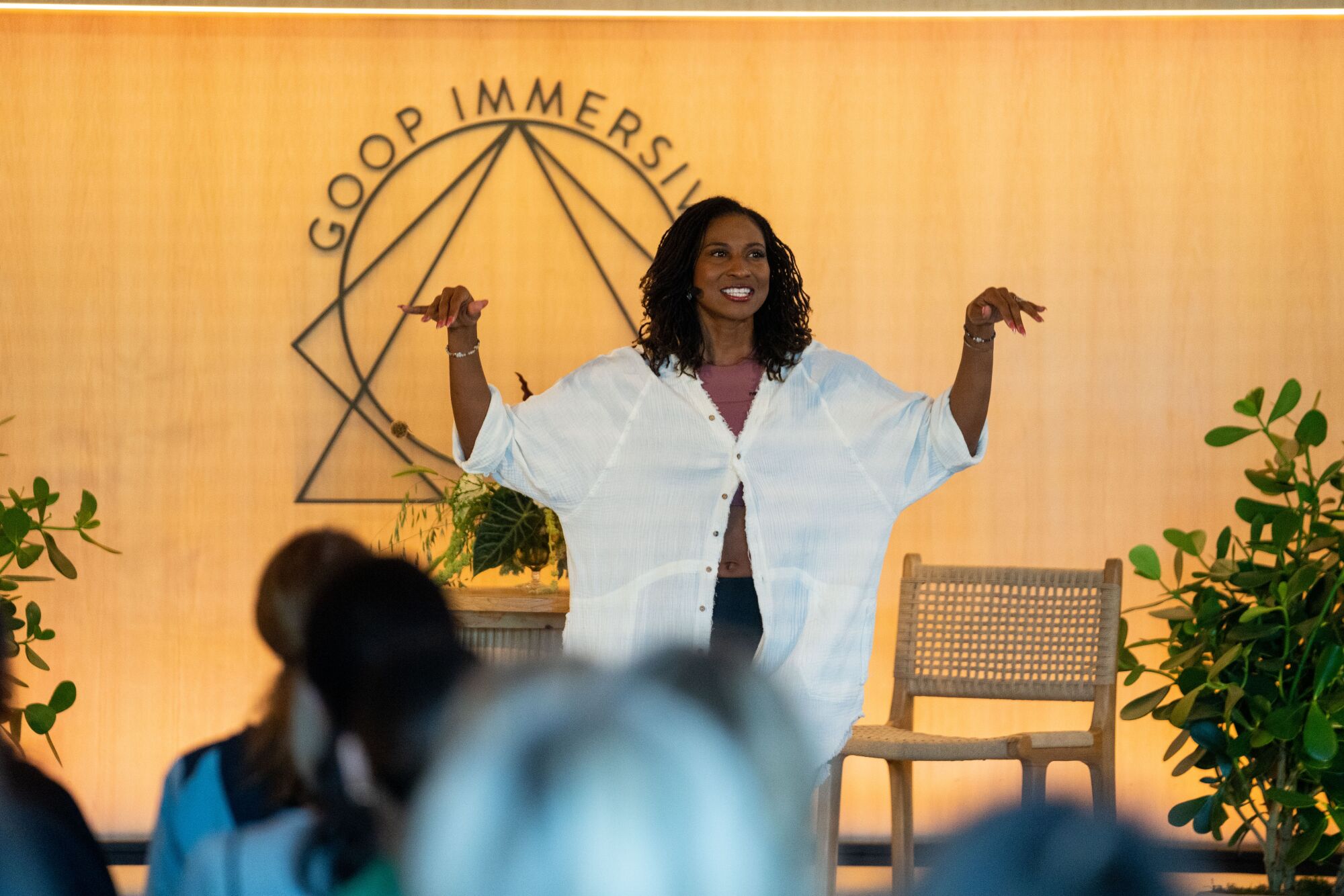
Koya Webb, a yoga teacher and holistic and wellness coach, speaks at the Goop Immersive event in Santa Monica.
(Kyle Espeleta for Goop)
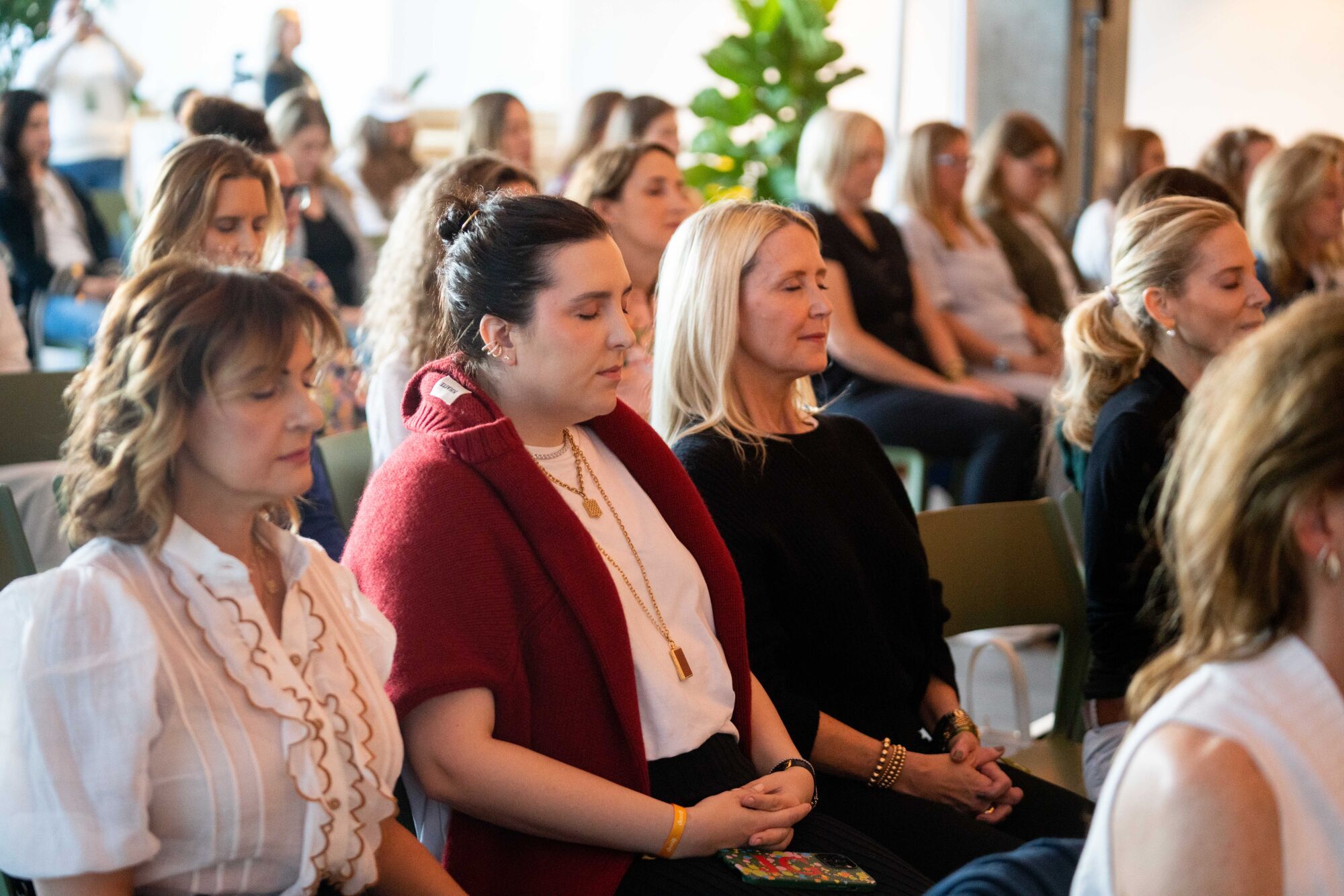
The crowd meditates at the Goop Immersive event in Santa Monica.
(Kyle Espeleta for Goop)
Yet balancing your hormones “is not a thing,” said Dr. Lauren Streicher, professor of obstetrics and gynecology at Northwestern University’s Feinberg School of Medicine. “You will never see the phrase ‘balance hormones’ in any scientific article. It’s absolute nonsense.” Further, “there is no such thing as ‘dirty hormones,’” Streicher explained. “No. These terms are not even remotely medically accurate.”
As women seek whatever resonating nuggets they can find from Goop, social media, celebrities, TikTok doctors and people professing to be “hormone experts,” there’s a lot of misinformation, and little supervision — including of the herbal products sold to women struggling for a solution, which are unregulated in the U.S., said Dr. Mary Jane Minkin, a clinical professor at Yale Medical School’s Department of Obstetrics, Gynecology and Reproductive Sciences. “So I don’t know what my patients are getting half the time when they tell me they’re doing this or that.”
No matter how frustrating that may seem, Streicher sees why the misinformation sticks. “If women went to their doctors and got good information, they would not be going to an actress,” she said. “The reason women do that is because their own doctors didn’t help them.”
‘Angel cards,’ broken vaginas … and an unfolding conversation
In a breakout session before lunch called “Cultivating Intuition,” an energy healer had us select an “Angel card” from a bowl. I got “grace” — perhaps it was what I needed in order to deal with all the menopausal challenges?
I also sat through a panel about how our failing bladders and dry, broken vaginas might be in need of some assistance since we’ve evolved to be sexual for longer. Dr. Karyn Eilber, a board-certified urologist with a subspecialty board certification in female pelvic medicine and reconstructive surgery, talked about laser and radio frequency treatments, vaginal estrogen, “vaginal rejuvenation” and other options to combat painful sex. Because if sex hurts, “why would you want to do it?” said Eilber.
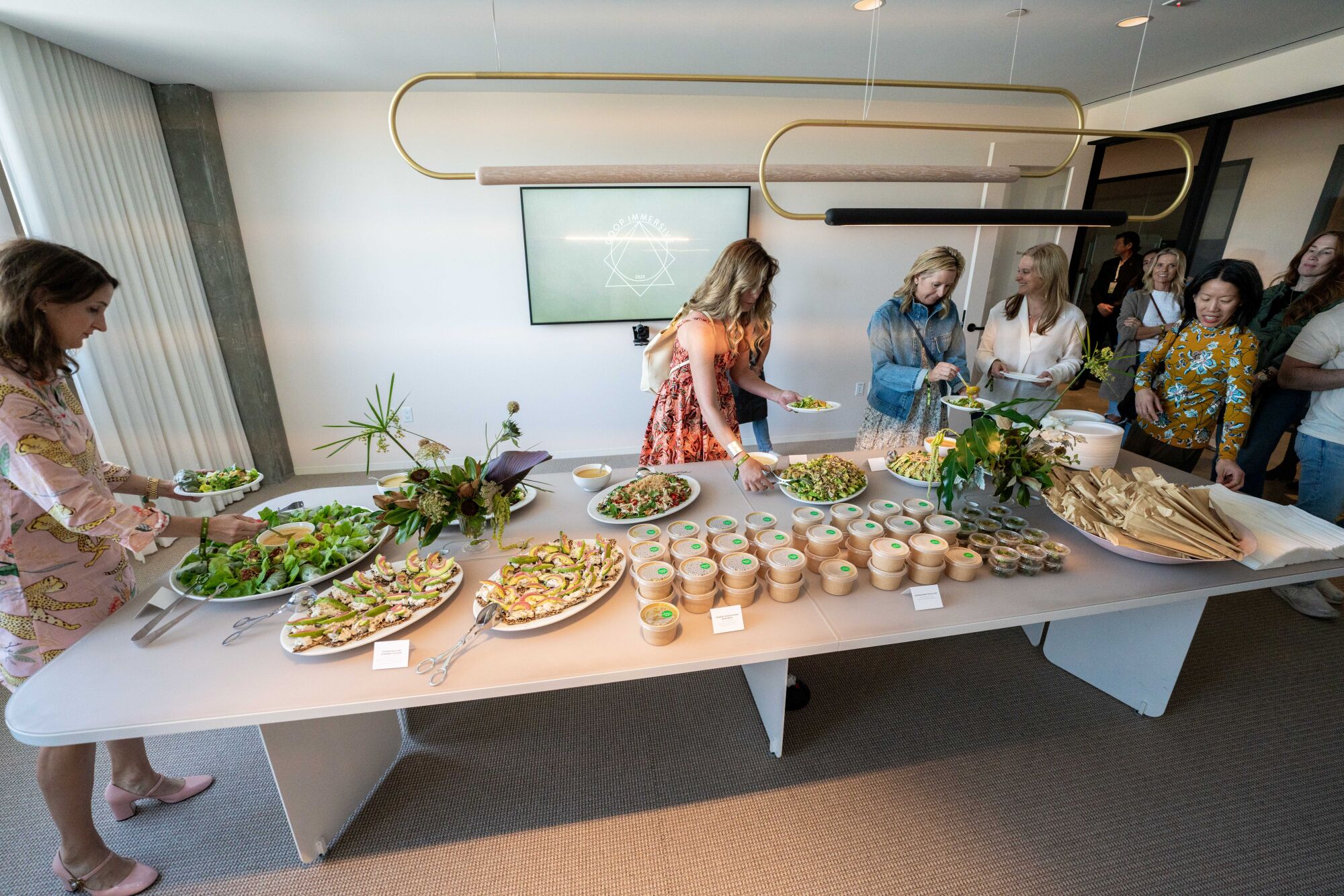
Salads and bone broth were served at the Goop event in Santa Monica.
(Kyle Espeleta for Goop)
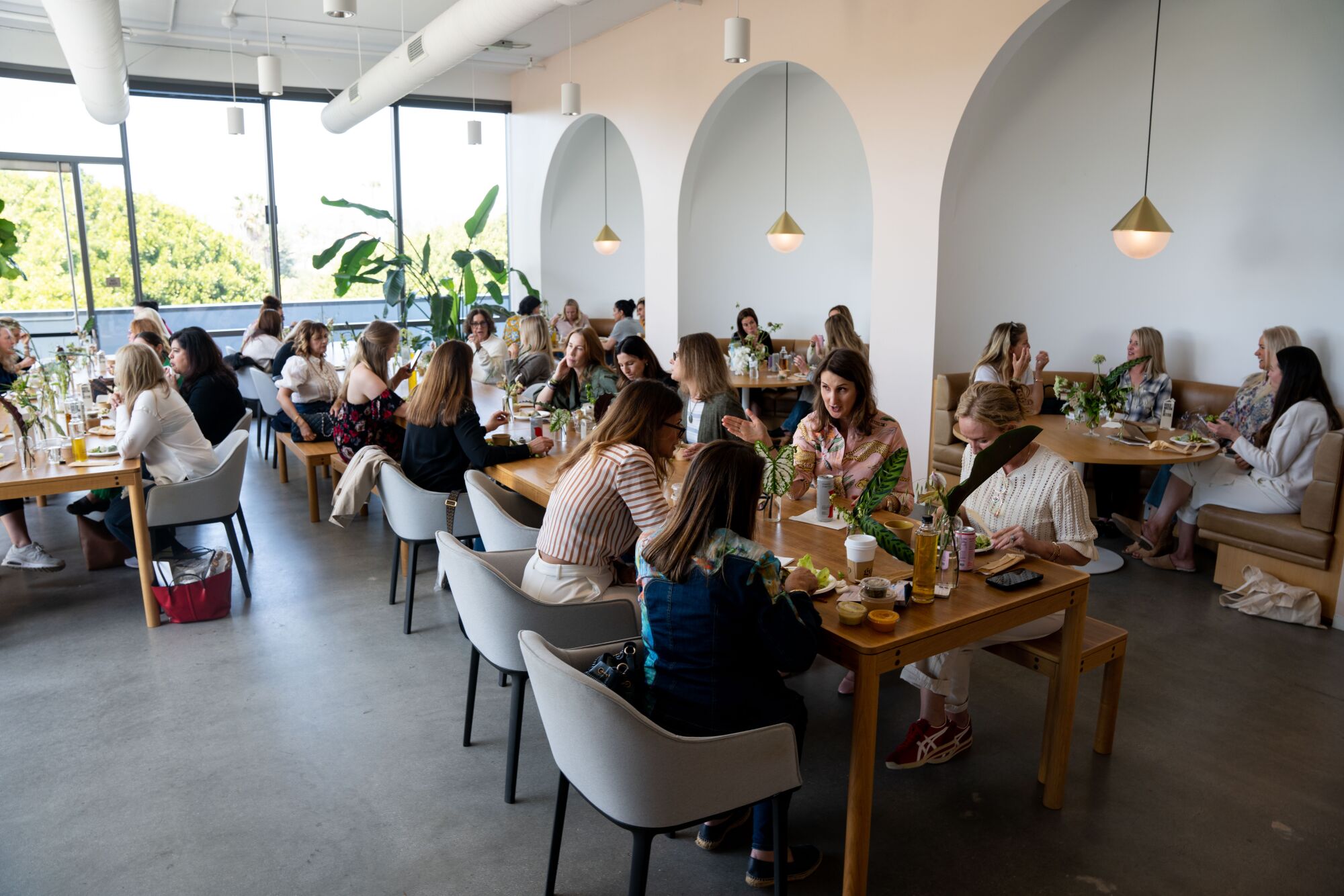
Attendees gather at lunch during the Goop event in Santa Monica.
(Kyle Espeleta for Goop)
After a lunch of turmeric-spiced chicken bone broth and a selection of salads from Goop Kitchen, we were left to digest the morning’s discussions and contemplate the state of our vaginas. Paltrow glided to the stage at 3 p.m. to rapturous applause. In a crisp white vest and pantsuit, she exuded high-wattage movie star glow. “What we’re in the process of trying to do, all of us together, here today and at Goop, is reframe this idea that women should be put out to pasture once we’re not of childbearing age,” the Oscar winner said. “I’m so happy to see that this is a conversation that’s moving into the forefront.”
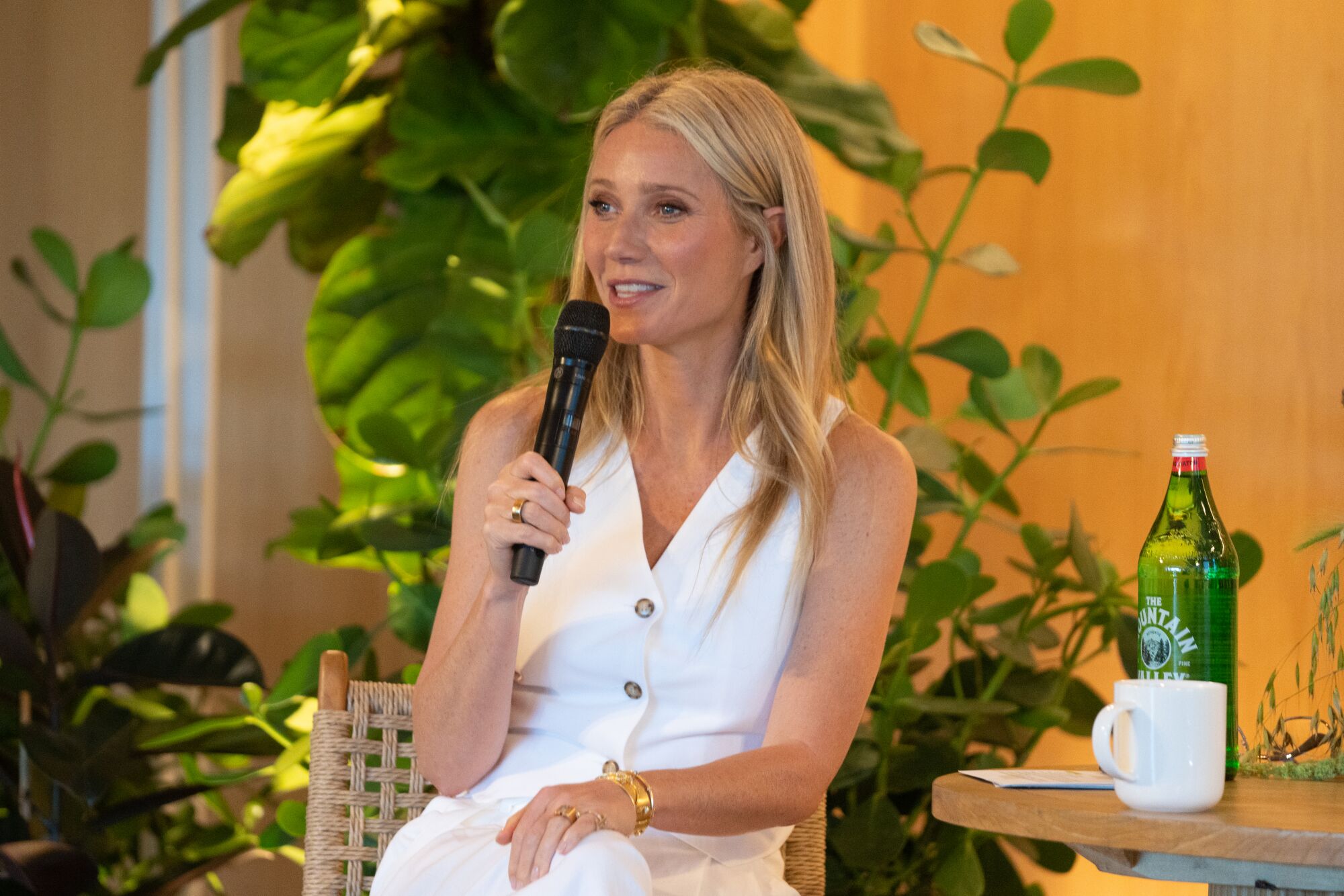
Gwyneth Paltrow speaks before a crowd at the Goop Immersive event in Santa Monica.
(Kyle Espeleta for Goop)
Despite the challenges women face in getting help for their symptoms, and the problem of structural inequity complicating who receives treatment and how (women of color experience more intense menopause symptoms, which begin earlier and often go untreated), there’s something monumental about this moment, particularly for those who’ve suffered in silence for so long.
Jancee Dunn, New York Times Well columnist and author of the new book, “Hot and Bothered: What No One Tells You About Menopause and How to Feel Like Yourself Again,” told me, “I was pitching menopause stories about five years ago and I could not get any takers. I would say hats off to Gwyneth Paltrow.”
Celebs made menopause ‘sexy.’ Now what?
Of course, outsourcing our medical care to Goop isn’t the real solution. An online survey of 3,150 perimenopausal women by the journal of Women’s Health, London, concluded that education, both for women and for health professionals, was key to improving the current conditions. There’s also the question of access. In the U.K., the government has recently recognized the need for more affordable hormonal treatments. They are “leagues ahead of us,” said Dunn. “Could you imagine somebody appointing a menopause czar here?” In the U.S., there’s been talk of creating menopause-friendly workplaces, but even that is mired in controversy: Will this truly help women, or further stigmatize us in an already ageist, often sexist culture?
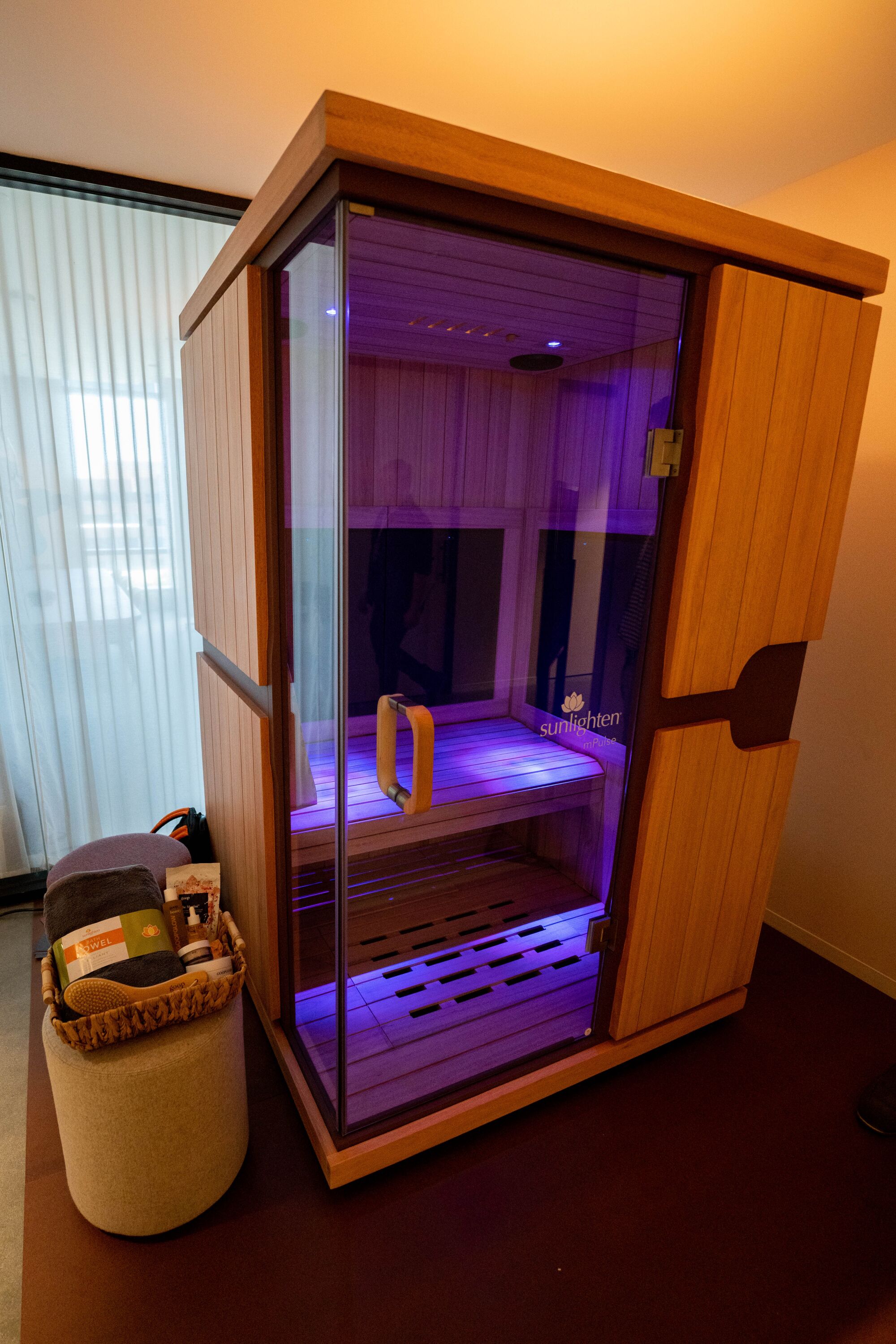
An infrared sauna at the Goop event in Santa Monica.
(Kyle Espeleta for Goop)
Perhaps the strongest positive about the celebrity move to reclaim menopause is that it brings the issue to the forefront, keeps it appealingly “sexy” and slowly, things begin to change systemically as well.
Lately, my calendar has been peppered with menopause-themed events and product launches, including both of Watts’ “The New Pause” symposiums, held in conjunction with the Swell (an online “global community and learning platform” for midlife), which offered “an afternoon of thought-provoking mini-talks, panel discussions, Q&A’s and a little dose of levity followed by cocktails.” Tickets started at $195 and went to $595 for a VIP ticket that included a dinner with Watts, or $45 for digital access. The events were jampacked with top experts and doctors in various fields of women’s medicine. Watts has also launched a menopause company called Stripes, which offers perimenopause and menopause solutions “from scalp to vag.”
Another event was a menopause bootcamp offered by Dr. Suzanne Gilberg-Lenz, an OB-GYN and author of the book “Menopause Bootcamp.” For a $75 fee, we sat in an intimate setting, got an expert’s overview on menopause and treatments, asked questions and were put through a workout to cap it off.
There are pop-up Menopause Cafes, which started in the U.K., creating spaces for women to confab over tea and cake. You can even go on a Menopause Vacation, with spas offering consultations with doctors and dietitians. “Aside from the panels, meeting other women [going through menopause] was the best part,” said Howard, the attorney from Chicago, reflecting on the Goop event.
What I’ve noticed most through the events I’ve attended is the joy with which women are unburdening themselves about these new midlife challenges and victories. Whether you buy into the promise of Goop-related hormonal accoutrement (or can afford to buy it at all), the entire concept of aging is, without a doubt, evolving.
But, for all the current glamorization of hormones, the real progress might come when menopause is treated as something we all face, just another part of a life well lived. “I would love for people to be blasé about it and to just shrug,” said Dunn. “They don’t recoil from it; it’s just a normal life transition, not a disease.”
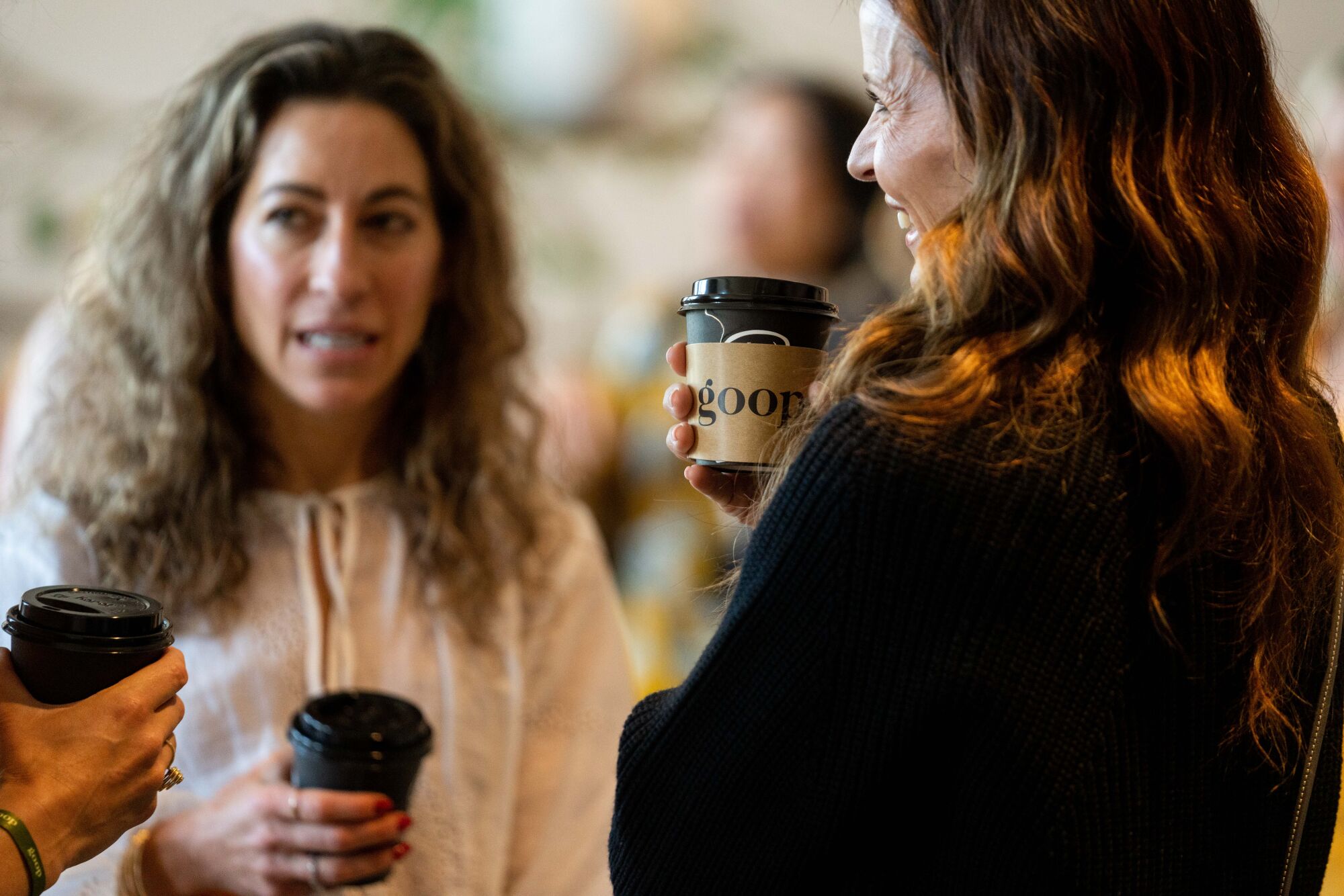
Women gather at the Goop Immersive event in Santa Monica.
(Kyle Espeleta for Goop)
For all the latest Life Style News Click Here
For the latest news and updates, follow us on Google News.
